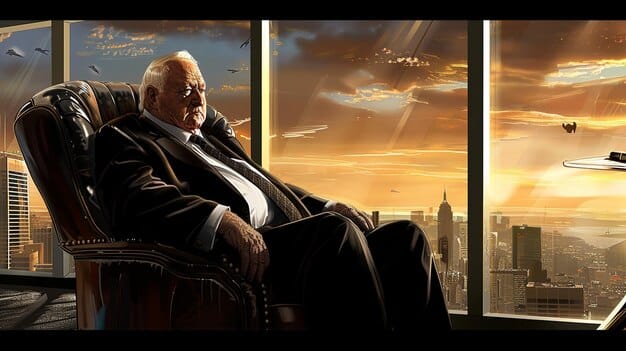From Flop to Phenomenon: Unveiling the Cult Classic Status of ‘Office Space’

From Flop to Phenomenon: The Untold Story of ‘Office Space’ and Its Rise to Cult Classic Status’ explores how a film initially deemed a box office disappointment resonated with audiences over time, achieving enduring cult classic status.
The journey of some films is a straightforward path to success, celebrated from their release. Others, however, take a more winding road, experiencing initial setbacks before finding their audience and cementing their place in cinematic history. From Flop to Phenomenon: The Untold Story of ‘Office Space’ and Its Rise to Cult Classic Status is a prime example of the latter.
Released in 1999, Mike Judge’s ‘Office Space’ initially struggled to find its footing. But what turned this comedy into the cult classic we celebrate today? Let’s delve into the story.
From Box Office Disappointment to Budding Cult Following
When ‘Office Space’ first hit theaters, it didn’t exactly set the box office on fire. In fact, it was considered a flop, failing to recoup its production budget during its initial theatrical run. Several factors contributed to this lukewarm reception; its release was overshadowed by bigger blockbusters, and its marketing didn’t quite capture the essence of its humor. The initial reviews were mixed, with some critics praising its satirical wit and others finding it too niche. However, even in its early days, there were whispers of a hidden potential, a sense that the film had something special that could resonate with a specific audience. This foreshadowed the slow but steady growth from flop to phenomenon.
Initial Critical and Audience Reception
The early reviews of ‘Office Space’ were a mixed bag. Some critics lauded the film’s sharp satire of corporate culture, while others found the humor too specific and not universally appealing. Audiences, initially, did not flock to theaters. This tepid response resulted in a less-than-stellar box office performance, and the film quickly faded from public consciousness.
Factors Contributing to the Initial Flop
Several elements coalesced to contribute to the film’s initial struggle. These include:
- Release Timing: The film was released during a period dominated by large-scale blockbusters, making it difficult for a smaller, more niche film to gain traction.
- Marketing Missteps: The marketing campaign didn’t effectively communicate the film’s humor, missing the mark with the target audience.
- Niche Appeal: The film’s focus on the mundane and often frustrating aspects of office life, while relatable to some, was not universally appealing.
Despite the initial failure, a seed of appreciation was sown, hinting at the eventual rise from flop to phenomenon.

Despite a challenging beginning, the film’s saving grace came in an unexpected form: home video. Its popularity bloomed among those who had experienced similar frustrations in their office jobs. This segment recognized not only the absurd humor but also the truthful commentary on corporate culture. People started sharing the movie with family and friends, turning them into fans. Word of mouth about how well the film captured something that many people endure created the base for its eventual rise, proving that from flop to phenomenon is a well-worn, but ultimately rewarding, path.
The Rise of Cult Status Through Home Video and Word of Mouth
The journey of ‘Office Space’ from a box office disappointment to a cult classic is a testament to the power of home video and word-of-mouth marketing. While the initial theatrical release struggled, the film found new life on VHS and DVD, allowing audiences to discover its relatable humor and satirical take on corporate culture.
The Impact of VHS and DVD
The release of ‘Office Space’ on home video marked a turning point for the film. It allowed viewers to experience the film in a more personal and intimate setting, leading to greater appreciation and deeper engagement. The accessibility of VHS and DVD allowed the film to reach an audience that had missed it in theaters, igniting the spark of its cult following. The film also benefited from being easily shared, contributing to its viral spread among office workers and beyond.
Word-of-Mouth Marketing and Online Communities
As more people discovered and connected with ‘Office Space,’ word-of-mouth marketing played a crucial role in its growing popularity. Fans shared their favorite scenes and quotes, creating a buzz that extended beyond traditional marketing channels. This organic growth was further amplified by the rise of online communities and forums, where fans dissected the film’s themes and celebrated its humor. Online, viewers were free to discuss their office experiences, highlighting how accurate and impactful the film was.
The slow rise of ‘Office Space’ is a study in how movies can, over time, find their audience. From VHS tapes being shared in offices to online groups praising the film, the story of ‘Office Space’ shows that from flop to phenomenon can occur when a film deeply connects with people.

Relatability and Satirical Accuracy: Why ‘Office Space’ Resonated
‘Office Space’ struck a chord with audiences because it masterfully captured the frustrations and absurdities of modern office life. It’s a satire that is both painfully accurate and hilariously exaggerated, portraying characters and situations that many viewers could instantly recognize from their own experiences.
The Portrayal of Corporate Culture
One of the key reasons for the film’s enduring appeal to its audience comes down to its ability to reveal the corporate world as it is. The monotony of the daily tasks, the overbearing bosses, and the pointless meetings all serve to show the way that real people deal with real situations. This kind of honest representation is exactly what can turn a simple movie into something that’s remembered.
- The film depicts characters trapped in dead-end jobs, stifled by bureaucratic processes and unfulfilling work.
- Viewers often recognized their own office environments and coworkers within the film’s exaggerated scenarios.
- The film’s satire challenged corporate norms and encouraged audiences to question the status quo.
Many have pointed to ‘Office Space’ as a key influence on later movies of the same kind. Its focus on the details of white-collar work as being bland and sometimes meaningless, coupled with the average person fighting against it, is something that continues to play well with audiences. The journey from flop to phenomenon for ‘Office Space’ highlights how a film that speaks truth to its audience can win out over time.
Characters and Their Universal Appeal
The characters in ‘Office Space’ are not just caricatures; they are relatable individuals with whom audiences can empathize. Peter Gibbons, the film’s protagonist, embodies the disillusionment and apathy that many feel towards their jobs. His journey of self-discovery and rebellion against the corporate machine resonates with those who have experienced similar feelings of frustration and discontent.
The Enduring Power of Satire
Satire’s ability to expose and critique societal issues through humor has allowed the film to stay relevant. By exaggerating the realities of office life, ‘Office Space’ encourages viewers to laugh at the absurdities of corporate culture and question the values that underpin it.
The movie’s comedic, yet accurate, portrayal of workplace dysfunction is a lasting testament to the film’s ability to connect with the average viewer on a deeper level. Even though it didn’t start off as a hit, the enduring cult classic status ‘Office Space’ enjoys proves the old adage: that a movie’s success can happen in unlikely ways. As such, the story from flop to phenomenon is not only interesting but teaches us about the unique relationship between film, culture, and audience.
Mike Judge’s Vision and Influence
Mike Judge, the creator of ‘Office Space,’ brought a unique comedic voice to the film, drawing from his own experiences working as an engineer. His vision shaped the film’s satirical tone, relatable characters, and incisive commentary on corporate culture.
Judge’s Background and Inspiration
Mike Judge’s personal experiences in the corporate world heavily influenced the creation of ‘Office Space.’ Having worked as an engineer for several years, Judge witnessed firsthand the monotony, bureaucracy, and dehumanizing aspects of office life. He channeled these observations into the film, creating a world that felt both familiar and absurd to audiences.
Themes Explored in Judge’s Work
Central to Judge’s work is making viewers think about the reality they know. It often includes themes of consumerism and alienation. ‘Office Space’ tackles these and other aspects of society, leading the viewer to question what is around them. This challenging aspect is a key component of the comedy, leading the mind to contemplate the world and the self.
The success of Judge’s work can be seen in the continued popularity of ‘Office Space,’ and goes to show that the path from flop to phenomenon is sometimes the most lasting way to reach an audience with humor and truth. With ‘Office Space’, Mike Judge created more than just a funny movie; he made a cultural touchstone.
Lasting Impact and Cultural References
‘Office Space’ has had a lasting impact on popular culture, influencing the way we talk about work, inspiring countless memes, and shaping the portrayal of office life in subsequent films and television shows.
Memes, Quotes, and Catchphrases
The film has provided a wealth of memorable lines and catchphrases that have become ingrained in our cultural lexicon. Lines like “I’m gonna need you to come in on Saturday” and “Sounds like somebody’s got a case of the Mondays!” have become shorthand for workplace frustrations and have been widely adopted in memes and online conversations.
- “Sounds like somebody’s got a case of the Mondays!”
- “I’m gonna need you to come in on Saturday.”
- “PC Load Letter? What the f*** does that mean?!”
These phrases are not just funny; they are touchstones for workplace issues, providing a kind of shared language for talking about the difficulties of modern work. The spread of these phrases is a factor in the continuing influence on corporate culture.
The legacy of ‘Office Space’ in film cannot be understated. What seemed like a failure now is recognized as something significant. The movie achieved its cult classic status from flop to phenomenon by connecting with viewers. The cultural impact remains strong even twenty years later. Future filmmakers and entertainers will surely find influence in this important work.
How to Watch ‘Office Space’ Today
For those looking to experience or revisit the cult classic, ‘Office Space’ is readily available on various streaming platforms, digital marketplaces, and physical media.
Streaming Platforms and Digital Marketplaces
The film is available to rent or purchase on major streaming platforms such as Amazon Prime Video, Google Play, and Apple TV. It can also be streamed on services like Hulu and HBO Max, depending on licensing agreements.
DVD, Blu-ray, and Physical Media
For those who prefer physical media, ‘Office Space’ is readily available on DVD and Blu-ray. Several special editions have been released over the years, featuring bonus content such as deleted scenes, commentaries, and behind-the-scenes features.
The continued availability of ‘Office Space’ on various platforms ensures that new generations can discover and appreciate its humor and satire. The film’s journey from flop to phenomenon continues as more viewers discover the sharp cultural insights woven into every frame.
| Key Point | Brief Description |
|---|---|
| 🎬 Initial Release | Box office flop, struggling to find its audience. |
| 🗣️ Word of Mouth | Gained popularity through VHS, DVDs, and online sharing. |
| 🏢 Relatability | Satirized corporate culture, resonating with office workers. |
| 😂 Cultural Impact | Influenced workplace humor and entered popular culture. |
Frequently Asked Questions
The film did not initially resonate with a broad audience during its theatrical run. However, it gained traction through home video releases and word-of-mouth.
Its relatability to office workers, satirical portrayal of corporate culture, and memorable characters have resonated deeply with a dedicated fanbase over time.
VHS and DVD releases helped the film reach a wider audience. Sharing and discussing the film became simpler and more mainstream in daily life.
Mike Judge directed the movie. Judge also had experiences working as an engineer. Drawing on these experiences enabled the realistic potrayal of the film’s setting.
Yes. Its themes of workplace frustration, corporate absurdity, and the search for meaning in work continue to resonate with modern audiences.
Conclusion
From initial box-office bomb to enduring cult classic, the story of ‘Office Space’ is an unlikely Hollywood tale. The film’s relatability, satirical bite, and memorable characters allowed it to connect with viewers in ways few films ever do. By capturing workplace issues so well, the film went from flop to phenomenon, achieving cult status.





